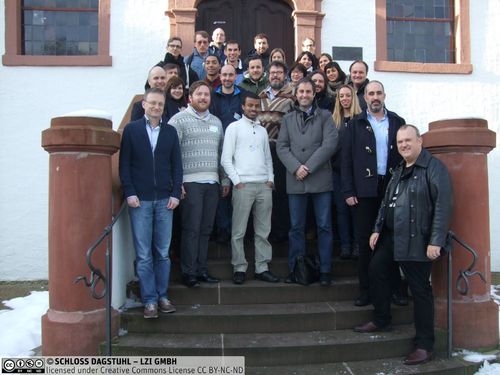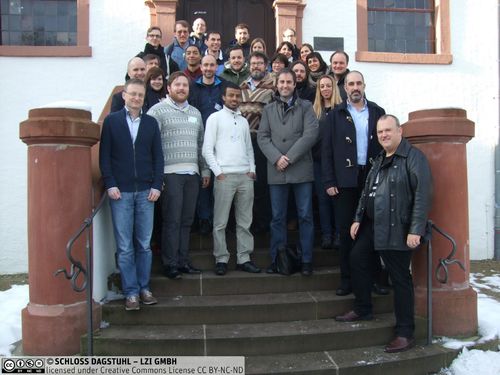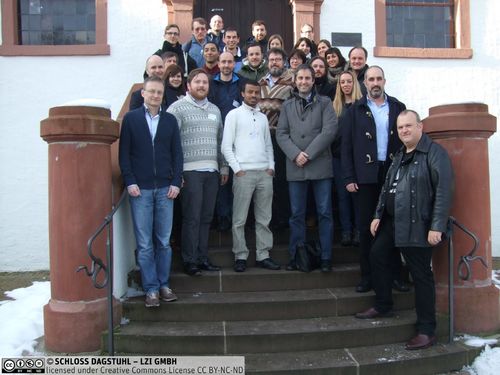Dagstuhl Seminar 15022
Quality of Experience: From Assessment to Application
( Jan 04 – Jan 07, 2015 )
Permalink
Organizers
- Katrien De Moor (NTNU - Trondheim, NO)
- Markus Fiedler (Blekinge Institute of Technology - Karlskrona, SE)
- Peter Reichl (Universität Wien, AT)
- Martín Varela (VTT Technical Research Centre of Finland - Oulu, FI)
Contact
- Annette Beyer (for administrative matters)
Impacts
- Dagstuhl Manifesto : Quality of Experience : from Assessment to Application : pp.315-318 : article - Moor, Katrien De; Fiedler, Markus; Reichl, Peter; Varela, Martin - Berlin : Springer, 2015 - (Informatik Spektrum : 38. 2015, 4).
- From Service Level Agreements (SLA) to Experience Level Agreements (ELA) : The challenges of selling QoE to the user : article in ICC'15 : IEEE ICC 2015 - Workshop on Quality of Experience-based Management for Future Internet Applications and Services (QoE-FI) - Varela, Martin; Zwickl, Patrick; Reichl, Peter; Xie, Min; Schulzrinne, Henning - Los Alamitos : IEEE, 2015. - pp. 1741-1746.
- Impact of Perceived Quality and other Influencing Factors on Emotional Video Experience : article in QoMEX - Antons, Jan-Niklas; Arndt, Sebastian; Moor, Katrien De; Zander, Steffen - Los Alamitos : IEEE, 2015. - 6 pp. - (Proceedings of the 7th International Workshop on Quality of Multimedia Experience (QoMEX) 2015).
- QoE beyond the MOS : Added Value Using Quantiles and Distributions : article in QoMEX 2015 - Hoßfeld, Tobias; Heegaard, Poul E.; Varela, Martin - Los Alamitos : IEEE, 2015. - 6 pp. - (Proceedings of the 7th International Workshop on Quality of Multimedia Experience (QoMEX) 2015) : article.
- QoE beyond the MOS : an in-depth look at QoE via better metrics and their relation to MOS : article, 23 pp. - Hoßfeld, Tobias; Heegaard, Poul E.; Varela, Martin; Möller, Sebastian - Berlin : Springer, 2016 - (Quality and User Experience ; 1. 2016 : article).
- Towards a comprehensive framework for QOE and user behavior modelling : article in QoMEX 2015 - Reichl, Peter; Egger, Sebastian; Möller, Sebastian; Kilkki, Kalevi; Fiedler, Markus; Hossfeld, Tobias; Tsiara, Christos; Asrese, Alemnew - Los Alamitos : IEEE, 2015. - 6 pp. - (Proceedings of the 7th International Workshop on Quality of Multimedia Experience (QoMEX) 2015).
Schedule
Within the past few years, Quality of Experience (QoE) has gone through an explosive growth and established itself as an independent, multidisciplinary field of research, both in the academic and industrial communities. Significant advances have been made with respect to the conceptual understanding of QoE as well as in terms of methodology and instrumentation. The proposed seminar will complement the previous Dagstuhl seminars 09192 "From Quality of Service to Quality of Experience" and 12181 "QoE: From User Perception to Instrumental Metrics", by building on the conceptual and practical expertise currently available and focusing on the application of QoE. While the conceptual grounds and methodological implications of QoE are a very interesting topic as such, including already an economical and business-oriented perspective, they represent rather milestones on the road to reach another ultimate goal: translating the theoretical and empirical understanding of QoE, its assessment and measures, into some form of economic and/or societal 'value'. This value can be rather explicit and concrete (e.g., increased revenue, or reduction of number of customer complaints), but it can also be intangible and more latent (e.g., customer loyalty, strengthened relation between a customer and a provider, enabling user empowerment, contributing to wellbeing, and at the same time addressing societal challenges).
In order to take this logical but challenging step from assessment to application, the proposed seminar will bring together academics from a range of disciplines (information and communication technology, user experience, economics, social sciences, customer relation management, etc.) with relevant expertise and practitioners in need of such expertise, along with researchers from related fields such as network and service management, cognitive networks and network economics. The discussions and work during the seminar will be oriented towards the following goals:
- increasing the understanding of annoyance and delight factors of QoE, including the underlying (technical) root causes and drivers;
- investigating the use of QoE in the definition of Service Levels Objectives and Agreements;
- exploring how the current QoE-horizon can be (also) oriented towards higher-level goals situated at the user/societal level (beyond/next to purely economic rationales);
- identifying new application domains which will benefit from QoE methods and tools;
- underlining the industrial relevance by using QoE knowhow in order to improve, optimize and monitor corresponding services and applications;
- defining a roadmap for industrial value creation based on QoE know-how.
Summarizing, the seminar is expected to create more awareness about user and societal aspects in relation to QoE and more specifically, to yield a better understanding of how QoE research could/should be oriented towards goals beyond or next to economic goals. Moreover, it will contribute to the establishment of new linkages between fields and stakeholders that are currently still too isolated from each other, and thus further promote the establishment of a truly interdisciplinary research community in this highly relevant and exciting research field.
Within the past few years, Quality of Experience (QoE) has gone through an explosive growth and established itself as an independent, multidisciplinary field of research, both in academic and industrial communities. Significant advances have been made with respect to the conceptual understanding of QoE as well as in terms of methodology and instrumentation, and the earlier Dagstuhl seminars 09192 "From Quality of Service to Quality of Experience" and 12181 "QoE: From User Perception to Instrumental Metrics" have played a catalyzing role in this process: for example, by putting key challenges on the agenda, by stimulating (collaborative) activities that address them and by contributing to the establishment of a multi-disciplinary community around the topic, involving a range of actors with sometimes very different, yet complementary perspectives, priorities and motivations in relation to QoE. The main goal of this seminar was to strengthen and go beyond the current understanding on Quality of Experience (QoE) and its assessment, in order to address a logical yet highly challenging next step, namely to move from assessment to application and to translate insights in QoE and knowledge from this research field into forms of economic and/or societal "value". The main underlying motivation is that - even though the conceptual grounds and methodological implications of QoE are a very interesting and worthy research topic as such - they also represent milestones on the road to reach another ultimate goal: translating the theoretical and empirical understanding of QoE, its assessment and measures, into "value". This value can be rather explicit and concrete (e.g., increased revenue, or reduction of number of customer complaints), but it can also be intangible and more latent (e.g., customer loyalty, strengthened relation between a customer and a provider, enabling user empowerment, contributing to well-being).
The seminar brought together 27 participants to work towards this challenging goal. They were representing 13 different countries and 17 different institutions, resulting in a variety of different backgrounds and specific expertise domains. The seminar took place over 2.5 days and was organized in such a way that time for group discussion and interaction was maximized, while the time for individual presentations was kept to a minimum. At the beginning of the seminar, every participant was invited to write down three challenges fitting within this overall scope of the seminar. Thereupon, a concise presentation round was organized. Every participant was asked to make a short statement (5 minutes/1 slide) related to her or his challenges. These personal statements are included in the form of short abstracts in this report.
The main challenges and questions put forward by the participants were clustered on the fly into six broader topics, around which the seminar group work was organized, namely: "Theory and modeling", "QoE methodologies", "User factors and QoE", "QoE management", "Monetization of QoE" and "QoE in new domains". The group work was divided into two parts, with three topics being discussed in parallel in both parts of the group work. The initial assignment of participants to the six groups was deliberately organized randomly instead of thematically. The intention was to mix up participants with different backgrounds and interests as much as possible in order to stimulate open discussions and flow of thoughts. Participants had the possibility to switch to another group by exchanging with another participant in case they had a strong preference for another group. Every participant was involved in two discussion groups.
In between part 1 and 2 of the group work, a plenary reporting session was organized. During this plenary session, each group briefly presented the main points discussed and potential joint activities. During the final plenary reporting and closing session, the main points and outcomes from the second part of the group work were presented. Extensive summaries of the discussions and main outcomes for each of the six working groups are presented in Section 4 of this report. Due to the time constraints, there was unfortunately not enough time for deep follow-up discussions in the plenary sessions. The seminar as such was also very briefly evaluated in the final plenary gathering. One important factor which would have further improved the participants' QoE and which was mentioned several times, is more time for "digestion" and "reflection" between the sessions (which was indeed limited, given the duration of the seminar). Overall however, and supported by the participants' feedback during and after the seminar, we can look back on a successful and productive seminar during which plans for several future and follow-up activities were made.
 Katrien De Moor, Markus Fiedler, Peter Reichl, and Martín Varela
Katrien De Moor, Markus Fiedler, Peter Reichl, and Martín Varela
- Jan-Niklas Antons (TU Berlin, DE) [dblp]
- Alemnew Asrese (Aalto University, FI)
- Katrien De Moor (NTNU - Trondheim, NO) [dblp]
- Philip Eardley (British Telecom R&D - Ipswich, GB) [dblp]
- Sebastian Egger-Lampl (AIT Austrian Institute of Technology - Wien, AT) [dblp]
- Markus Fiedler (Blekinge Institute of Technology - Karlskrona, SE) [dblp]
- Farnaz Fotrousi (Blekinge Institute of Technology - Karlskrona, SE) [dblp]
- Pantelis Frangoudis (INRIA Rennes - Bretagne Atlantique, FR) [dblp]
- Samuel A. Fricker (Blekinge Institute of Technology - Karlskrona, SE) [dblp]
- Juan Pablo González Rivero (Plan Ceibal - Montevideo, UY)
- Poul Einar Heegaard (NTNU - Trondheim, NO) [dblp]
- Tobias Hoßfeld (Universität Duisburg-Essen, DE) [dblp]
- Kalevi Kilkki (Aalto University, FI) [dblp]
- Eirini Liotou (University of Athens, GR) [dblp]
- Toni Mäki (VTT Technical Research Centre of Finland - Oulu, FI) [dblp]
- Sebastian Möller (TU Berlin, DE) [dblp]
- Peter Reichl (Universität Wien, AT) [dblp]
- Miguel Rios Quintero (TU Berlin, DE) [dblp]
- Werner Robitza (TU Berlin, DE) [dblp]
- Henning Schulzrinne (Columbia University - New York, US) [dblp]
- Lea Skorin-Kapov (University of Zagreb, HR) [dblp]
- Samira Tavakoli (Technical University of Madrid, ES) [dblp]
- Christos Tsiaras (Universität Zürich, CH) [dblp]
- Astrid Undheim (Telenor Research and Development - Trondheim, NO) [dblp]
- Martín Varela (VTT Technical Research Centre of Finland - Oulu, FI) [dblp]
- Min Xie (Telenor Research - Fornebu, NO) [dblp]
- Patrick Zwickl (Universität Wien, AT) [dblp]
Related Seminars
- Dagstuhl Seminar 09192: From Quality of Service to Quality of Experience (2009-05-05 - 2009-05-08) (Details)
- Dagstuhl Seminar 12181: Quality of Experience: From User Perception to Instrumental Metrics (2012-05-01 - 2012-05-04) (Details)
- Dagstuhl Perspectives Workshop 16472: QoE Vadis? (2016-11-20 - 2016-11-25) (Details)
- Dagstuhl Seminar 23042: Quality of Sustainable Experience (QoSE) (2023-01-22 - 2023-01-25) (Details)
Classification
- multimedia
- networks
- society / human-computer interaction
Keywords
- Quality of Experience
- usability
- user experience
- content
- network monitoring
- quality measurement
- service pricing
- network management
- application management




 Creative Commons BY 3.0 Unported license
Creative Commons BY 3.0 Unported license
